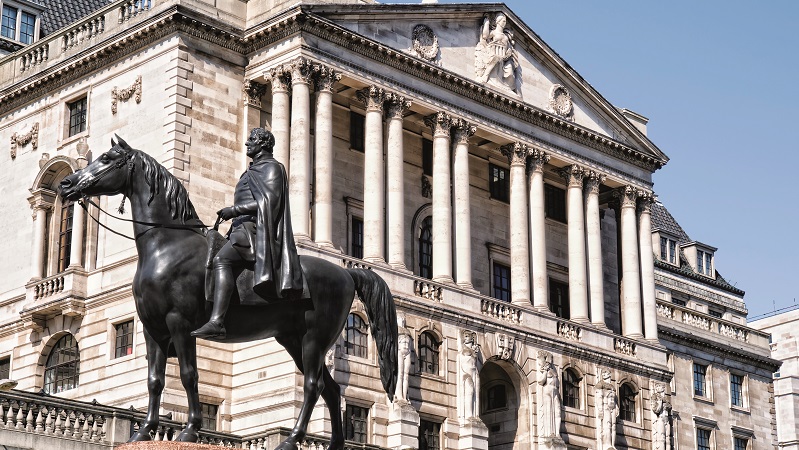The Bank of England has revised its inflation expectations upwards to top 3% as inflation creeps up but it will maintain its 0.1% bank rate.
On Thursday the Monetary Policy Committee (MPC) revised its predictions for inflation upwards, stating it is likely to exceed 3% for a temporary period. It attributed the upwards revision to developments in energy and other commodity prices but stressed these effects will be “transitory”.
Last month inflation rose by 2.1%, overshooting the central bank’s 2% target. Across the pond in the US the annual consumer prices index registered even higher at 5% in May, the highest rate since 2008.
Despite this the MPC voted unanimously to maintain its low interest rate level of 0.1% and to maintain the stock of sterling non-financial investment-grade corporate bond purchases at £20bn. It also voted 8-1 to continue its programme of UK government bond purchases, maintaining the target for the stock of these government bond purchases at £875bn.
Britain’s central bank said it does not intend to tighten monetary policy “at least until there is clear evidence that significant progress is being made in eliminating spare capacity and achieving the 2% inflation target sustainably”.
‘Inflation may be alive and well, or flat on its back’
Though the Bank of England has insisted inflationary pressures are transitory AJ Bell financial analyst Laith Khalaf said judging from the current macro data it is difficult to know for sure.
“Like Schrödinger’s cat, inflation may be alive and well, or flat on its back, we just can’t tell which right now,” Khalaf said. “However, it’s likely that after years of strong performance in assets like bonds and tech, which thrive in a low inflation environment, investor’s portfolios are under-prepared for an inflationary period and it would be wise to address that imbalance.”
He added: “Cash savers also need to brace themselves for more pain, because near-zero interest rates look here to stay for the foreseeable and even transitory inflation is going to mean cash in the bank is losing its buying power.”
For You Asset Management chief executive Derrick Dunne with inflation having breached the bank’s 2% target and 1.8% prediction “it’s no longer a question of whether rates will rise but of when and by how much”.
“Summer has arrived, lockdown restrictions are set to be removed in a matter of weeks and pent-up demand from UK consumers is already suggesting a stronger-than-expected economic recovery,” Dunne said.
“For now, the bank remains convinced that the strength of inflation is only ‘transitory’. But just as the committee will continue to monitor the situation closely, so investors should be open to the chance of that conviction fading as the full effects of our unlocking take hold. Once again, cautious optimism is the order of the day.”
BoE less tolerant than the Fed to above-target inflation
Sam Pham, investment strategist at Tilney Smith & Williamson, notes that while the MPC’s latest statement appears more dovish than previous speeches, it is “less tolerant to consistently above-target inflation” than the Federal Reserve.
Pham said: “This relative hawkishness has two important implications. First, interest rates traders are already pricing in more likelihood of a rate hike by the BoE than the US Fed over the next twelve months. So any future hawkish surprise by the Fed will weigh on the cable exchange rate, just like the Fed’s June meeting did last week.
“Second, the prospect of higher UK inflation and interest rates favour shorter duration UK fixed income, and inflation-linked to nominal UK government bonds.”
The MPC has also revised its forecast for the level of GDP in Q2 2021 up by around 1.5% since it reported in May. It now expects output in June to be just 2.5% below its pre-Covid 2019 Q4 level.
It said: “Output in a number of sectors is now around pre-Covid levels, although it remains materially below in others. The housing market remains strong and indicators of consumer confidence have increased.”










